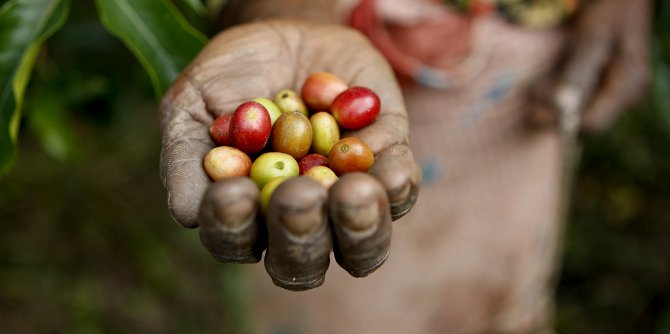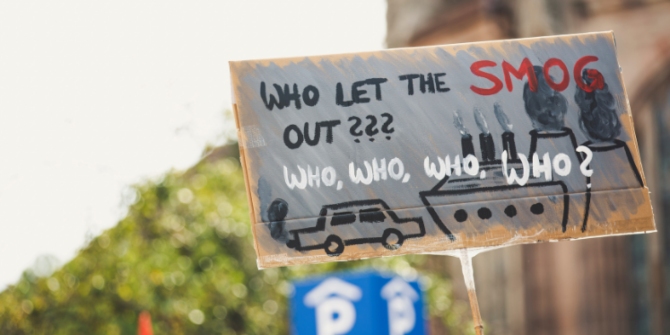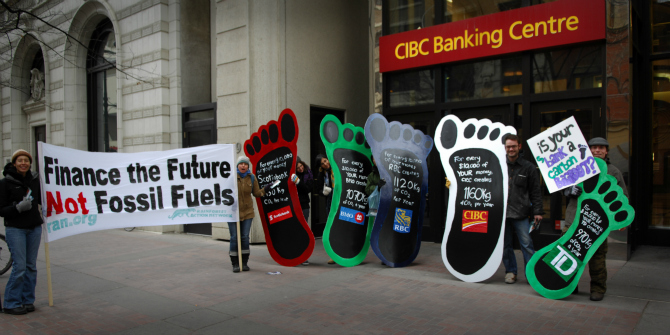 Douglas Beal argues that agreement from world leaders to commit to the United Nations’ 17 Sustainable Development Goals in New York is only a first step. He writes that national governments must now take the lead in turning these goals into real change and improvements in their citizen’s lives, at the same time as balancing economic growth and protecting the environment.
Douglas Beal argues that agreement from world leaders to commit to the United Nations’ 17 Sustainable Development Goals in New York is only a first step. He writes that national governments must now take the lead in turning these goals into real change and improvements in their citizen’s lives, at the same time as balancing economic growth and protecting the environment.
The United Nations (UN) summit In New York to agree the Sustainable Development Goals (SDGs) takes place against a depressing background. Seemingly every day, there are new scenes of crisis, poverty, human displacement and environmental damage somewhere in the world. The urgent need for a concerted global effort to tackle the root causes of these disasters by promoting sustainable development has never seemed stronger.
Nor can anyone doubt the hard work which has gone into drawing up the 17 goals to be discussed and, hopefully, agreed in New York. A huge amount of effort from a great many people has gone into ensuring they focus on all that needs to be done. But it is this comprehensive nature – and the 169 sub-goals – which set tough challenges for individual countries.
While agreement from world leaders to commit to the goals is essential, it is only a first step. It is national governments, not the UN, which must take the lead in turning these ambitions into real improvements in the lives of their citizens. Success will hinge on how well they decide their priorities, put in place the right policies to deliver progress and ensure implementation has the right impact.
Our work in developing countries has found the crucial importance of governments setting clear priorities and providing leadership to the international partners in their country. When they do, impressive progress can be achieved.
A good example is Ethiopia, where in the late 1990’s the government began a concerted effort to address serious health issues. It created a 20-year health care agenda and brought donors in to support the effort. As a result, Ethiopia improved its health care and outcomes more than any other country according to our Sustainable Economic Development Assessment (SEDA), a diagnostic tool developed to measure relative well-being in countries around the world.
Choosing the right priorities must start with an accurate assessment of where the greatest problems are. This may not always correspond with received wisdom. There is a widespread belief, for example, that Africa’s biggest challenge remains health but this ignores the remarkable progress of recent years.
These improvements are underlined by the findings of our SEDA research, which shows 19 of the top 20 countries improving on health are in Africa.

Coffee Pickers in Timor-Leste Credit: United Nations Photo (Flickr, CC-BY-NC-ND-2.0)
This contrasts with the findings on education where sub-Saharan Africa holds 23 of the bottom 25 places. Putting this right requires not only increased efforts from governments themselves but for them to lead a whole new dialogue with aid agencies and international organizations.
It also requires governments – and their international partners – to look beyond the most obvious development areas such as health and education into the more politically-sensitive areas such as income inequality, the strength of civil society and the quality of governance. These can be particularly important. Our analysis has found that the biggest gap with countries that are above average in overall well-being and below average in overall-well-being is in the quality of governance.
Countries also have to take into account, in a way which the experts drawing up the SDGs do not, how some of the goals can act against each other. Take, for example, economic growth and protecting the environment. It is no accident, for example, that China and India – two of the countries who have recorded some of the strongest rise in GDP in recent years – hold the bottom slots globally in terms of our environmental scores.
Our most recent SEDA research highlights how difficult achieving success in both areas tends to be. While poverty reduction often hinges on GDP growth, we found that countries that posted high GDP growth tended to fall back in terms of environmental quality.
The goals also aim to reduce inequality within and among countries. But our SEDA analysis found that in Asia, countries with high levels of overall well-being – as measured by a number of factors such as health, education and employment – had greater income inequality than those nations with relatively low levels of well-being. The same is true in Africa.
Achieving a healthy balance between potentially conflicting goals is not impossible. Poland, for example, has posted healthy GDP growth but is also making impressive progress in protecting the environment. In Latin America, the countries with the highest levels of overall well-being also tend to have relatively low levels of income inequality.
But the potential for conflict within the SDGs is another challenge which governments and their international partners must carefully think through. It confirms the importance of a careful, accurate assessment of the state of a country, where efforts can achieve the best outcomes and to chart progress.
Here the UN and international organizations can play an important role. They can help governments understand better how other countries overcame similar problems. Support can be given to put in place an effective system for collecting data and tracking improvements so that red flags can be raised early when interim goals are in danger of being missed. This is one of the most common areas where leaders talk to us about the need for additional help.
The Sustainable Development Goals rightly set big ambitions for our world. But the sheer size of these ambitions pose difficult challenges for countries. They rely on governments and their leaders to provide focus, on good governance and strong institutions. The hard work has only just begun.
A version of this article also appeared at BCG Perspectives.
Please read our comments policy before commenting.
Note: This article gives the views of the author, and not the position of USAPP – American Politics and Policy, nor the London School of Economics.
Shortened URL for this post: http://bit.ly/1RbIwde
_________________________________
 Douglas Beal – The Boston Consulting Group
Douglas Beal – The Boston Consulting Group
Douglas Beal, is Partner and global leader on economic development, at The Boston Consulting Group. He tweets at @beal_douglas.






